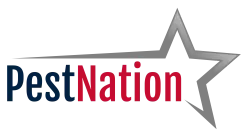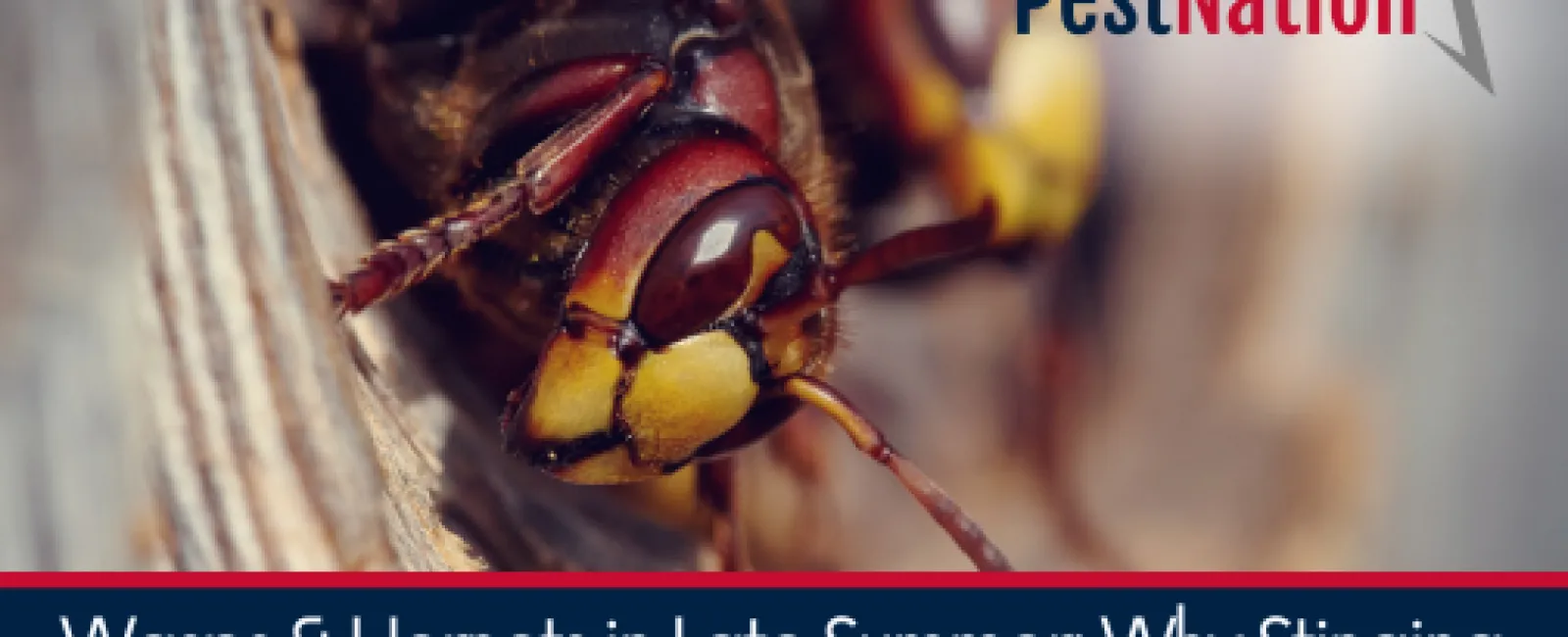Late summer may bring backyard barbecues, pool days, and evening gatherings—but it also marks the height of stinging insect activity, particularly when it comes to wasps and hornets. Across Atlanta, Charlotte, and Charleston, residents often find themselves dodging aggressive buzzing threats just to enjoy time outdoors. As temperatures climb and food becomes more abundant, wasps and hornets become increasingly active, territorial, and dangerous. Their peak season typically occurs in July and August, a time when colonies reach their largest size and workers become more aggressive in protecting their nests.
Contrary to popular belief, these insects aren't just a nuisance—they pose real risks. Their stings can cause allergic reactions, serious injuries, and in rare cases, life-threatening anaphylaxis. Children, pets, and outdoor workers are especially vulnerable during this time. At PestNation, we understand the seasonal patterns of stinging pests and offer effective solutions through PestNation pest inspections, targeted treatments, and year-round quarterly services designed to keep these threats at bay. This article explores why wasps and hornets are such a concern in late summer and how PestNation helps you stay protected.
Why Wasps and Hornets Are More Active in Late Summer
1. Colony Size Peaks in July and August
The lifecycle of a wasp or hornet colony begins in spring when a single fertilized queen emerges from hibernation to establish a new nest. Over the course of several months, she lays eggs that hatch into workers—non-reproductive females tasked with building the nest, foraging for food, and defending the colony. By mid to late summer, the colony reaches its maximum size, often containing hundreds or even thousands of individuals.
At this stage, wasps and hornets shift from passive foraging to more aggressive defense behaviors. They are more likely to sting when disturbed, and their sheer numbers make interactions more dangerous. This peak population is especially problematic in densely populated areas like Atlanta, Charlotte, and Charleston, where outdoor human activity frequently overlaps with insect habitats.
2. Food Becomes Scarce, Making Wasps More Aggressive
Wasps are natural scavengers. Early in the season, they feed primarily on other insects—helping control pests like caterpillars and aphids. However, by late summer, their food supply starts to dwindle. This nutritional shift causes wasps to seek out sugary and protein-rich human foods, such as:
-
Picnic leftovers
-
Fruit and soda
-
Pet food
-
Garbage bins
As they become more desperate for sustenance, they also become more aggressive. This is when they're most likely to hover around patios, invade trash cans, or even enter homes through open windows and doors.
Identifying Wasps and Hornets Around Your Property
Different species behave differently, and identification is key to effective treatment. Here are the most common types of stinging insects we encounter during PestNation pest inspections in Atlanta, Charlotte, and Charleston:
Yellowjackets
-
Small and sleek with black and yellow coloring
-
Build nests in the ground or wall voids
-
Extremely aggressive when disturbed
-
Known to sting multiple times
Paper Wasps
-
Long legs, thin waists, and brown/yellow coloring
-
Build umbrella-shaped nests under eaves, decks, and railings
-
Less aggressive unless provoked
-
Sting when defending their nest
Bald-Faced Hornets
-
Larger and black with white markings
-
Build large, enclosed paper nests in trees or on buildings
-
Highly territorial
-
Sting repeatedly and spray venom when agitated
During a PestNation inspection, our technicians evaluate the location, species, and stage of colony development to determine the safest and most effective removal strategy.
Why DIY Wasp and Hornet Control Is Risky
Trying to remove a wasp or hornet nest yourself in late summer is not only ineffective—it can be dangerous. By July, colonies are large and highly defensive. Even approaching a nest can trigger an aggressive swarm response.
DIY sprays, traps, or knockdown methods often fail because:
-
Sprays don't reach the entire nest cavity
-
Physical removal can disturb the colony
-
Traps reduce a few individuals, not the colony
-
Ground nests are difficult to detect and treat
Additionally, improper removal can increase the likelihood of repeated stings. Individuals allergic to wasp venom may experience severe reactions from even one sting, and multiple stings from an angry swarm can lead to serious medical emergencies.
This is why PestNation's interior and exterior pest treatments are so critical. Our trained professionals use specialized tools, protective gear, and targeted treatment methods to eliminate nests safely and completely.
PestNation's Process for Wasp and Hornet Management
1. PestNation Pest Inspections
Every wasp and hornet treatment begins with a detailed property inspection. Our experts evaluate:
-
Eaves, soffits, and overhangs
-
Decks, porches, sheds, and fences
-
Tree canopies and shrubbery
-
Attics, wall voids, and crawl spaces
In Atlanta, Charlotte, and Charleston, we often find nests in hard-to-see areas such as roof junctions or behind shutters. Identifying these hotspots is crucial for long-term prevention.
2. Targeted Treatment and Nest Removal
Depending on the species and nest location, PestNation uses a variety of professional-grade solutions:
-
Residual insecticides for active nests
-
Aerosol knockdown agents for immediate elimination
-
Physical nest removal for high-traffic areas
-
Barrier sprays to discourage re-nesting
We also implement non-chemical strategies where appropriate, including caulking entry points and removing food attractants.
3. Year-Round Quarterly Services
Stinging insects can return season after season if their nesting sites remain accessible. That's why PestNation's quarterly services are designed to provide ongoing protection. With routine visits, we:
-
Monitor for new nests
-
Apply preventive treatments
-
Reinforce exclusion methods
-
Offer seasonal education to homeowners
For residents in Charleston, Charlotte, and Atlanta, our quarterly program offers peace of mind and reduces the need for emergency wasp removal later in the season.
Tips for Homeowners to Reduce Wasp and Hornet Activity
While professional pest control is the most effective way to manage stinging insects, there are also steps you can take to reduce their presence around your home:
-
Seal Cracks and Gaps: Use caulk and weatherstripping to close potential nesting entry points.
-
Secure Trash Bins: Keep outdoor trash cans sealed and clean to avoid attracting scavenging wasps.
-
Cover Food Outdoors: Use mesh food covers during outdoor meals to prevent wasps from invading.
-
Limit Fragrant Plants Near Entryways: Sweet-smelling flowers can draw wasps close to doors and windows.
-
Inspect Your Property Regularly: Especially around rooflines, attic vents, and fences.
Still, even the most diligent homeowner may find themselves facing a nest. That's where PestNation pest inspections and customized treatments make all the difference.
Why Summer Wasps and Hornets Demand Immediate Action
The later you wait to address a wasp or hornet issue, the bigger—and more dangerous—the problem becomes. Each day in July and August, nests grow larger, and the risk of aggressive encounters increases. If you see a high number of wasps hovering near your home or discover a nest forming under your eaves, don't delay.
A call to PestNation brings professional insight, targeted treatment, and lasting protection tailored to your home's specific risks and layout. Our technicians serving Atlanta, Charlotte, and Charleston understand the unique pest pressures of the Southeast and use that knowledge to eliminate threats efficiently and safely.
Late summer is prime time for wasps and hornets, and the risks they pose go far beyond the annoyance of a few buzzing intruders. As colonies reach their peak and food sources dwindle, these stinging pests become more aggressive, more territorial, and more dangerous. Whether they're building nests in your eaves or swarming your patio during dinner, their presence shouldn't be ignored.
PestNation offers a proven approach to Charleston, Charlotte, and Atlanta pest control that prioritizes safety, effectiveness, and long-term results. Through expert PestNation pest inspections, strategic interior and exterior pest treatments, and year-round quarterly services, we ensure your home remains protected not just from stinging insects, but from the entire spectrum of seasonal pests.
Don't let wasps and hornets take over your summer. Trust PestNation to bring back your peace of mind—and your outdoor space.

